#i still have my thesis to write!!
Explore tagged Tumblr posts
Text
in theory i knew that it takes a lot of time because i've been through it before. but i've forgotten the existential dread that comes with applying for jobs, the endlessness of it. even the most simple application takes me at least 30 mins, it's like a fucking full-time job at this point
#and i dont have that time!!#i still have my thesis to write!!#things to submit!!#but im also constantly worried about being homeless and jobless when i graduate!!#aaaaaa#🌹
0 notes
Text
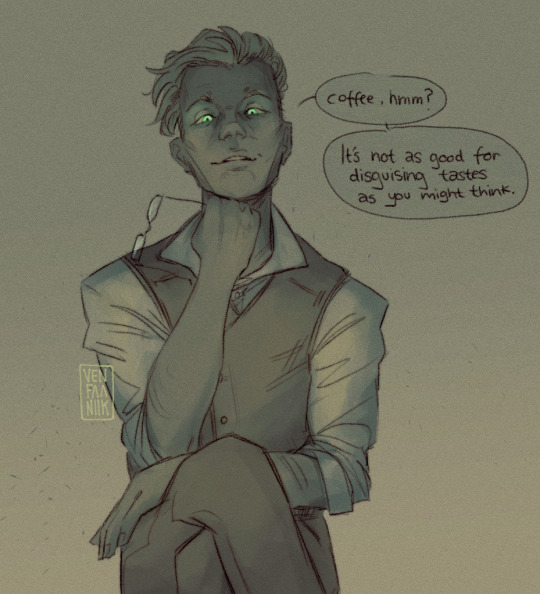
thank @turtlemurmurs for sponsoring this coffee
#my art#artists on tumblr#sketches#ko-fi sketch#tma#the magnus archives#elias bouchard#the brainrot is still here btw l just have a thesis to write#once i graduate i can show how jonathan sims saved my career
553 notes
·
View notes
Text
Okay, my brain refuses to think about anything other than Murderbot, so I looked at every use of the word "friend[s]" in TMBD and... created some pie charts. Normal human activities.
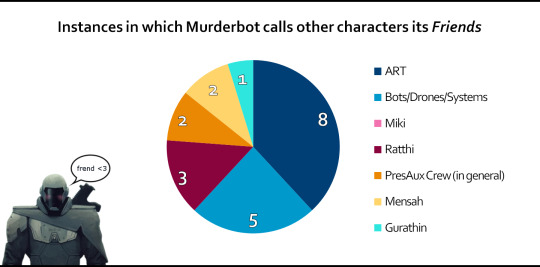


Some Thoughts™ I had while putting this together (under the cut):
In All Systems Red, Murderbot notes that the PresAux crew are all close friends (twice! and goes on to explain their internal relationships which I think is very cute). This is pretty much the only use of 'friends' in ASR, except for when Murderbot says that SecUnits can't be friends with each other.
It seems that this may be one of the first times Murderbot has ever really been around a group of friends before? Murderbot notes that this is not the norm for its contracts and admits that the fact that they are all friends and the way they interact with each other make it actually enjoy that contract (before!!!! the hostile attack, so it already enjoys this contract before they start seeing it as a person etc ghghhhh). [Inference: Friendship seems enjoyable.]
The first character that calls Murderbot its friend is ART in Artificial Condition. Murderbot immediately refutes this (and then goes on to call ART its friend to its clients for the rest of the book). [Inference: Maybe ART is Murderbot's friend. And maybe that is... agreeable]
Rogue Protocol has more than twice as many instances of the word 'friend' as any of the other novellas. Why? Miki. Friendship and its implications for non-humans are a central theme because Miki is friends with everyone. Murderbot initially scoffs at the notion that Miki and Miki's humans are friends. At the end of the book, after witnessing how desperately Don Abene tried to stop Miki from trying to save them, and her grief after its death, Murderbot has to admit that she had in fact been Miki's friend. [Inference: Humans can be friends with bots and can sincerely care about them]
In Exit Strategy, Murderbot tentatively uses the word "friends" for its humans for the first time (several times actually). It questions whether it can actually call them its friends or not and later realizes that it had been afraid what admitting that the humans are its friends would do to it. At the end of the book, Mensah tells Murderbot the PresAux crew are its friends, which is the first time a human has directly said that to it (at least on-page). [Inference: Humans can and want to be Murderbot's friends]
In Network Effect, Murderbot seems to be more habituated to the word 'friend', confidently calling ART and Ratthi its friends, like it is no longer just trying the concept on unsure if it fits. There are many instances in which other characters refer to MB as ART's friend or the other way around and Murderbot's humans refer to Murderbot as their friend several times. Generally, there seems to be less hesitancy, because yes, all of them are Murderbot's friends, why wouldn't they be. [Inference: SecUnits can have friends. This SecUnit has friends. They care about it a lot.]
Conclusion: The Murderbot Diaries tell the story of a construct that does not seem to consider the possibility of friendship for itself and is fine with that - until it accidentally starts caring a little too much and suddenly more and more people annex it as a friend (ew) to the point where it can no longer deny that this is happening and has to begrudgingly admit that yes, it has friends now and maybe that is actually not a bad thing.
#the murderbot diaries#murderbot#𓄿#hi i'm READY to write a thesis about murderbot i am having way too much fun with this#i created a pretty excel spreadsheet and everything#i don't know why i did this but now i can look at them while i think about this more! so i figured i'd share them haha#i didn't count uses of 'friendly' but special shoutout to when MB is all alone in its cold cubicle missing 20% of its body mass#and starts putting on a show because 'the friendly noise would keep it company' 😭😭#i feel sick thinking about murderbot all alone on its own not knowing what its like to have friends watching media for 'the friendly noise'#also YES okay i wanted to make a point about miki there but i just#couldn't bring myself to talk about that more so... yeah#also uhhh this data is very subjective#i didn't count particularly ironic uses of 'friend' and generally did not count every instance of friend and sometimes it was a hard call#also i probably shouldn't have counted the times murderbot refered to drones or secsystems as its friends (often after hacking them)#but murderbot does seem to care about them and shows kindness and respect and sometimes points out that a system is friendly#so while i don't think MB means “friend” in the same way referring to them as when it refers to ART for instance#i still think its CUTE and also kinda funny how many times that happened so i decided to keep those!!!#but yeah take my data with a grain of salt lol
788 notes
·
View notes
Text
Me, rambling to my wife about this crackpot theory I came up with in the shower about how Les Miserables may have been an answer to The Count of Monte Cristo, or at least could be read as such: ... But then Valjean didn't personally screw Javert over like Dantes' enemies did-
My wife: Are you sure Valjean didn't screw Javert? I thought I read that on AO3 once.
#the train of thought leading up to my statement was whether it was Valjean one could read as a foil to Dantes or Javert#'cause of Javert's whole obsession with bringing Valjean to justice#bookblr#les miserables#the count of monte cristo#anyway nothing's gonna come of this crackpot theory of mine 'cause I am no longer in school and have no more essays to write#but by golly this would be a delicious topic to write a big ol' thesis style paper on#still an English major nearly 10 years out of cool leg apparently#well both these books are French but still#OKAY BUT LISTEN the two authors were contemporaries#and maybe arguably friends? according to the bio sketch of dumas in the intro of my CoMC copy?#I would have to do more research on their relationship and also whenabouts each was writing their respective thing#cause iirc aren't both books set around the same time period as well (mid-19th century) with a lot of the action being in Paris?#anyway right#ignore me and my nerdy nerdy book thoughts#these have been rambling tags with usagi
89 notes
·
View notes
Note

Just reading some comics and saw a panel I thought you might like. :)
ah fuck, characters reminiscing always get to me ;__;
but i will never ever get over that fond way these two talk to and abt each other. especially when they’re poking fun, you can just hear the love in their voice it’s SICK.
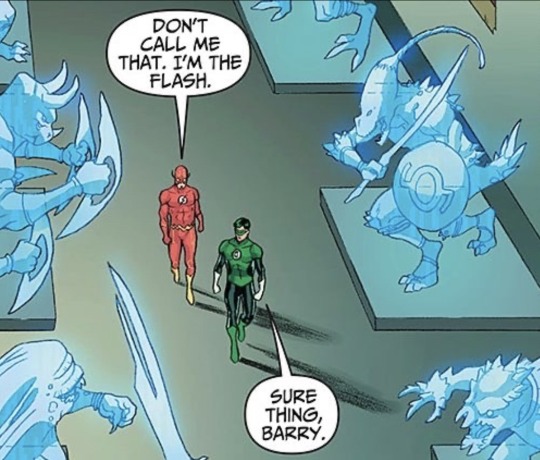
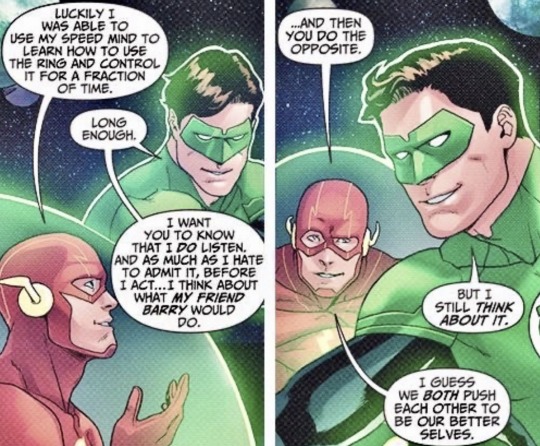
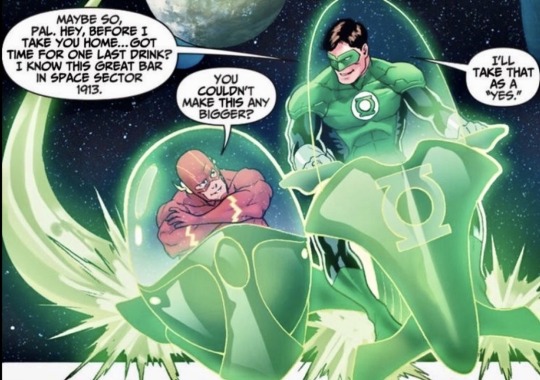
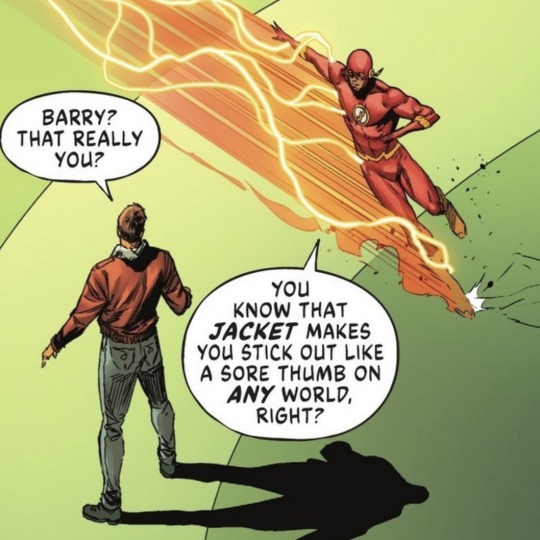
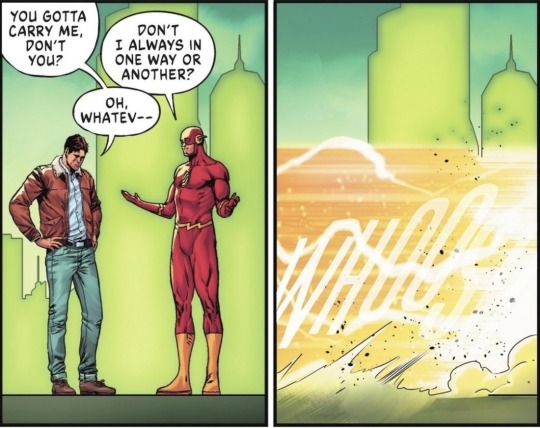
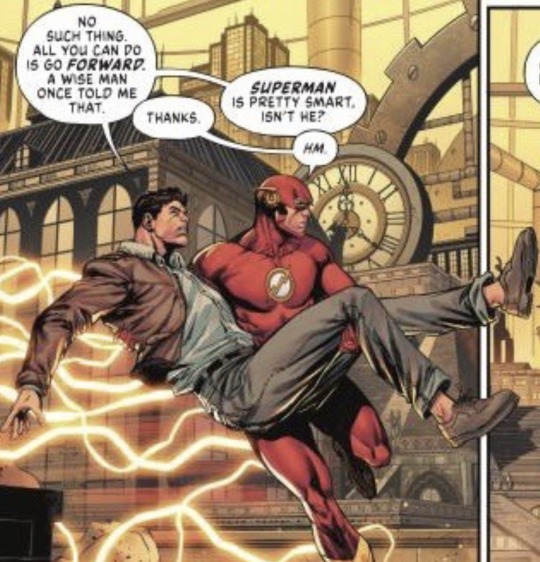

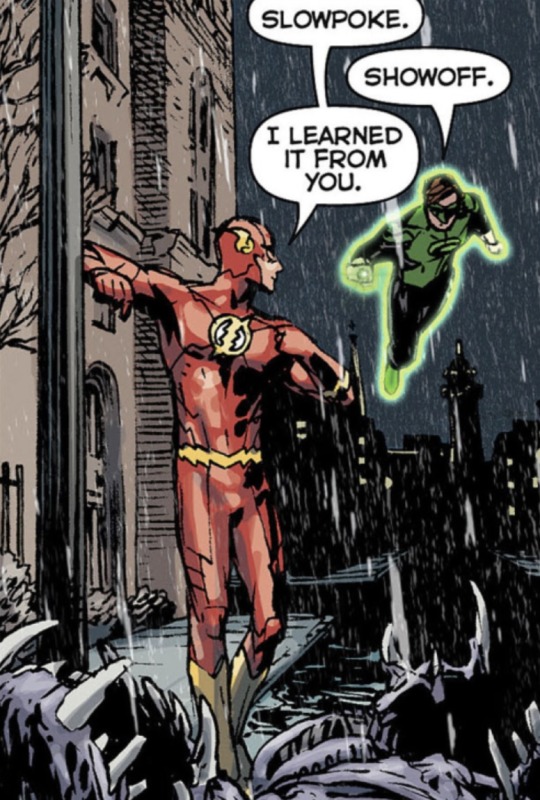
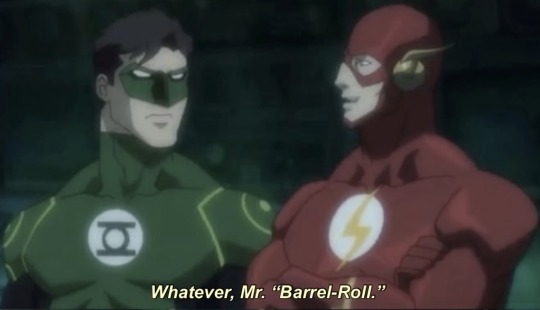
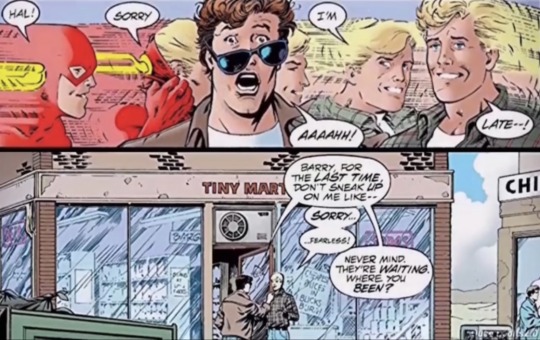
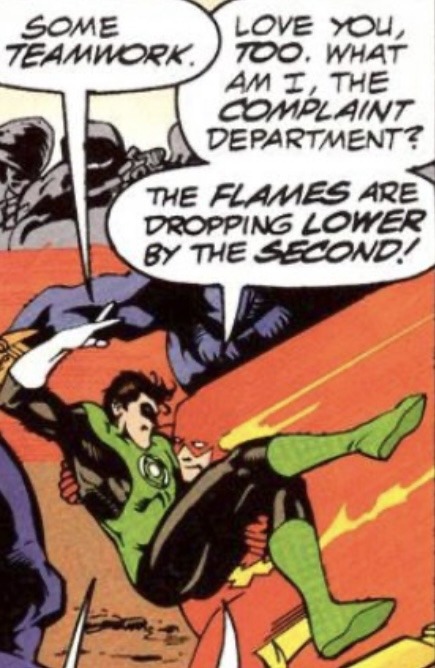
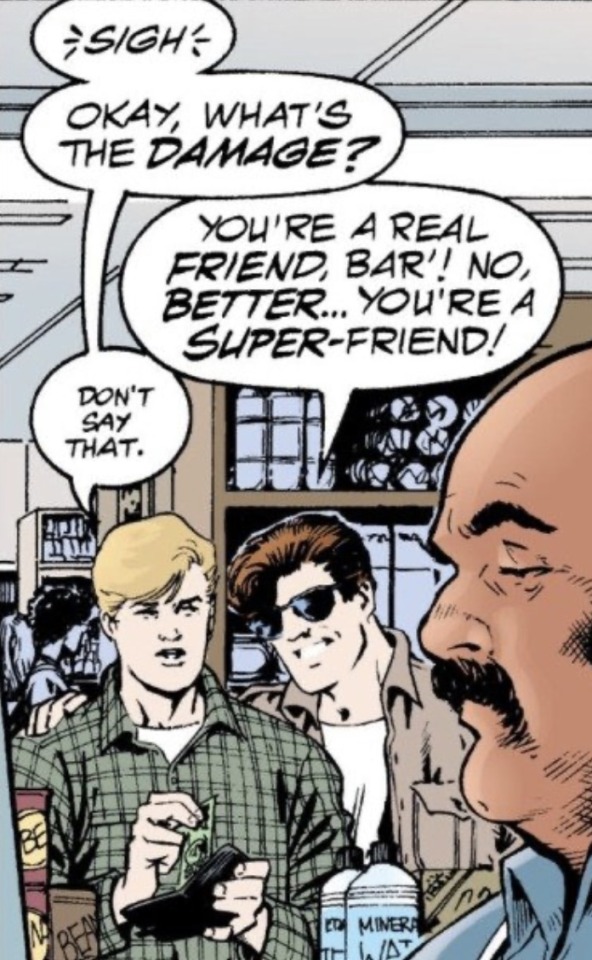
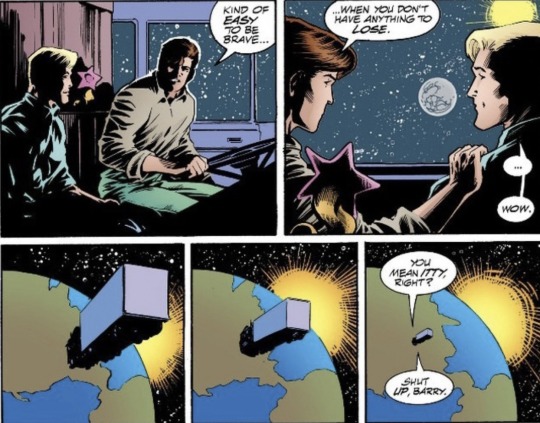
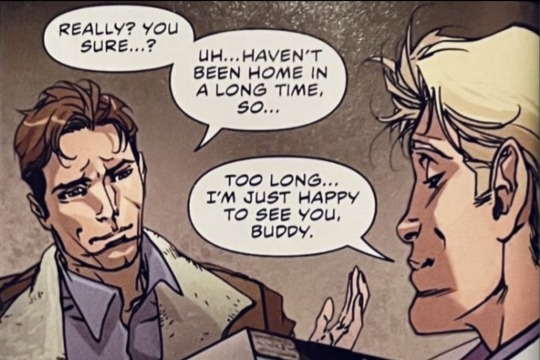
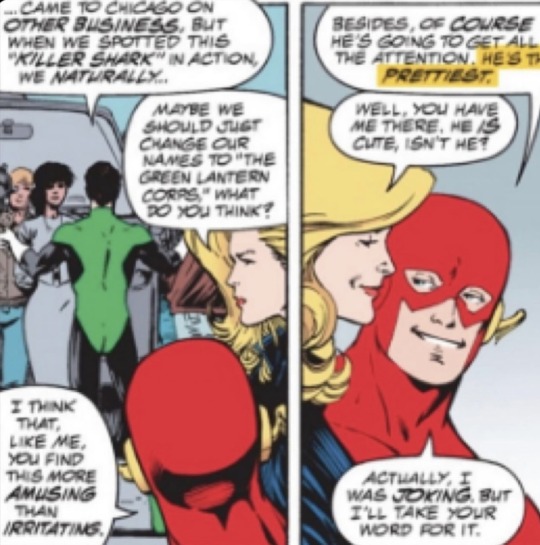
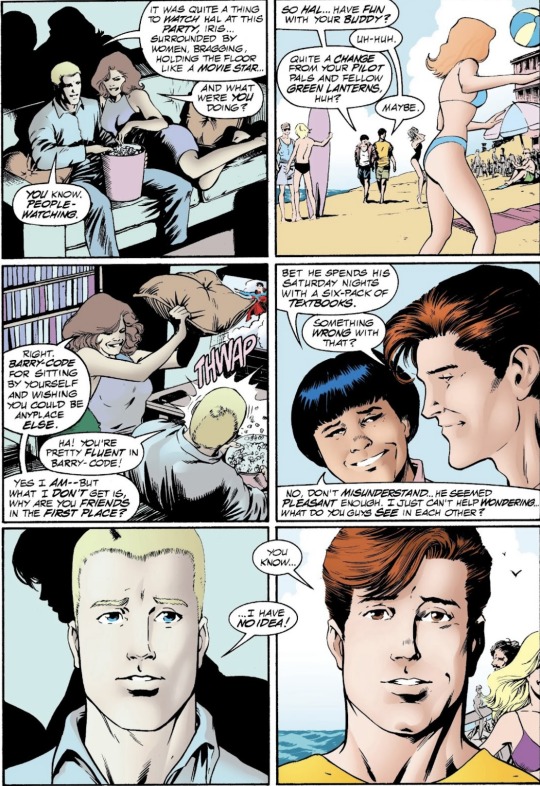
the halbarry love language is annoying each other, but even more than that, it’s being each other’s exceptions
#panels#sent to me#halbarry#hal jordan#green lantern#barry allen#the flash#dc#danswers#the halbarry love language/exceptions thing btw is a whole thesis i have in my brain#their love language incompatibilities; their willingness to compromise and make it work; the way they’ve never had a friend like this#hal esp is almost like a completely different person around barry. like he’s still Hal ofc but it’s obvious that he’s never navigated a#relationship like this before. yes i’m talking abt ‘what do you guys see in each other?’ / ‘yk… i have no idea! ☺️’#hal is so aro-coded for someone i don’t hc as aromantic. and that’s only bc barry came along (another whole thesis o’ mine…)#god literally the rare exceptions to each other#been thinking abt writing a halbarry fic abt their love languages (5 chapters 1 love language for each)#not rly sure what that’d even be abt but i do think abt this often so maybe writing smith would help me process/explore/share my analysis +#interpretations of how that works between them#idk i’m not a writer we’ll just have to see
345 notes
·
View notes
Text
Holding out hope that the writing in veilguard will get more bearable but rook saying to lucanis that it's "not nice that Spite hurt him" and he "shouldn't accept that it’s fine bc it wouldn't be ok if a person did that" like. That is a demon. Built off a single emotion called SPITE. Rook I am finding it really hard to believe that u have lived in thedas for more than 30 seconds.
#wow the demons which are one of the consistently evil forces in these games did something bad#hey players do you know that that was not nice#ok thank you. do u think I am 4#dav spoilers#veilguard spoilers#dragon age the veilguard#also grinding my gears that everyone (including dalish elves???) just immediately accept the evanuris are evil/have come back#like the first person to not immediately believe it is the first warden and honestly he is the only character so far I respect#like maybe if this was like inquisition and a huge hole in the sky/rifts opened everywhere#but it seems like nothing like that happened but everyone somehow magically knows about the ritual and instantly believes everything rook sa#the more I think about these things the more annoyed I get#guys did you know being a leader means u sometimes need to make hard decisions... varric taught me that in my ma15+ game#i am enjoying the combat at least lol and I like Bellara and want to see Babylon so I'm in it for the long haul#why does everyone have a gun to their head making them nice though like it's so painfully out of place sometimes#and being able to only say the same thing but in a slightly boring slightly funny or slightly serious way is driving me insane#like I seem to be the only one who had no problem w the limits on dialogue in inquisition but this is driving me insane#Mourn watch rook what if you were somehow boring and nice. yay thank you bioware#ALSO rook stop talking and forming opinions without me getting to choose what u say like no I don't want u to day we have to save that perso#ok I swear I'm done now.. I need to go back to writing my thesis instead of grinding my teeth about this game#this is all coming from an inquisition enjoyer as well (sorry) but like so far I have found nothing I enjoyed about inquisition in this game#maybe if the inquisitor and Ghilan'nain are cool latee on I can focus on that (big maybe)#I am only early on still (just met first warden) so there is still time... i guess..
31 notes
·
View notes
Note
Not to harsh your joy regarding your personal project, (which does sound awesome!) the fact that you keep answering the "can I do fanfic?" questions with "technically yes, but have you considered not doing that?" does not actually *feel* very fanfic friendly. (Especially for anyone who enjoys fanfic as a hobby and isn't also an ofic writer. For example, I personally write almost exclusively character studies that are an explicit reaction to canon; there is no real way to write that sort of thing except as fanfic.)
Which is just a long-winded way of requesting that you maybe consider less of a caveat with the FAQ if you make one, please.
oh that was definitely not my intention, thanks for the ask! I think it was mostly just because I got that same question a few times in a row from various anons within the same time span (including some that were not published publicly), it just happened that I was thinking of my own project(s, plural now) in the last day when I answered those two, for those who want an extra creative challenge.
There's a reason my own original thing has been in my head for the last ten years without me actually writing it while I've written and posted tons of fanfiction, and even now some of my original works are going to be based on Arsene Lupin, so they'd technically be considered fanfiction since they're based on and use an established work for the characters and settings --
--writing completely original fic *is* harder, and that's exactly why I'm *suggesting* (not requiring!) that people consider taking 1 out of short story 4 challenges to look at their work in a new light.
90% of what I read and (until I actually start and finish my original works) 100% of what I've written in my life is fanfic. I have nothing against fanfic, otherwise I woudn't even be interested in creative writing.
But its also not a diss to say "Would you consider looking at your [fanfic] writing from a new angle and try to figure out different ways of going about it?"
Honestly, being able to even consider this option *as a fun extra challenge* is meant to help improve your writing and creative skills; it's not meant as a cheap shot at people who choose to write fanfiction because I my self write and read tons of it,
it's me saying "if you want even more practice at creative writing during these monthly challenges, try branching out a little bit from your comfort zone, you may be pleasantly surprised."
People who write and read fanfiction already have tons of creative experience, and if people like me and many other fanfic writers who one day dream of being published authors, want to broaden our horizons and seek new experiences, one of the easiest exercises is to take something we're planning on writing or already wrote, and see what we would change to make it brand new and standalone--
-- something that not only helps you come up with new ideas, but also will help when it comes time to *edit*, which can be, depending on the length and complexity of your story, can be a complicated process:
whether that means having to delete scenes entirely,
changing what a character says,
altering an aspect of the worldbuilding to fix plot holes
, re-writing your character so they're not overpowered because it was ruining the stakes and tension,
changing the POV of chapters because it was ruining the flow of the story,
etc etc etc.
I love fan fiction.
I love reading it and I love writing it, and for many people who take on monthly writing challenges, it is a way to test ourselves and gear ourselves up and prove to ourselves that not only can we write x amount of words, but it proves to ourselves that we are *capable of creating*, and for many creatives, that ultimately leads to crafting our own unique stories;
if you're already taking place in a monthly writing challenge, why not push the bounds a little bit *if you're so inclined* and test the waters? Especially when you're surrounded by a community who is cheering you on, every step of the way?
Every Nanowrimo I ever won was fanfiction. Heck, even not during November I once did 40k words in two weeks for a fic.
I always stalled out when I tried to write original works;
it is much easier to start small with a single short story than it is to try to write an entirely original novel, and my encouraging people to try baby steps by *experimenting* with one short story out of four in a month is not meant to be a diss against fanfiction,
but an *encouragement to those like me* who were so eager to write original works but floundered when I tried to jump into the deep end and felt disheartened.
Many fanfic authors aspire to write original fics, and thats who that challenge is for, for the people who want to write original works but are too afraid to fully commit; I'll still be writing and posting fanfiction even if I become a published author, even If I just have to come up with a few new pen-names to post them under.
There's absolutely no judgement on anyone who wants to write fanfiction for these challenges, my "caveat" as you say, is only there as encouragement to those like me who are afraid to take the first step, or uncertain of how to even *begin* that first step, not any kind of condemnation.
TL;DR:
I did not mean for my responses on the "can I write fanfiction" to come off as rude or looking down on fanfiction, its meant to be an encouragment to all the people like me who love fanfic and started out writing fanfiction, and dream of writing original works to take the first step, with a community of like-minded people all taking the same challenge.
Like every other challenge aspect of these events, taking a fanfic idea and turning it into an original short story is completely optional and meant as inspiration, just like following prompts for events is not mandatory, and even completing the 30k word goal is not mandatory; the goal for this month is to create, get in the habit of creating, and having fun with it!
#replies#long post#I gotta leave for work but hopefully this clarifies?#I might just be reading too much into it or vice versa?#my posts are not meant to be rude or an attack but theyre meant to be#encouragement and inspiration for those looking for it#just like having prompts and the option of doing short stories for november instead of one long complete work etc#writing a thesis statement - a dissertation - a fanfic - an original work - a technical manual-- all of these are still writing#this whole event is optional with additional optional challenges and prompts meant to spark creativity and flexibility
32 notes
·
View notes
Text
The role of Pryce and Carter's Deep Space Survival Procedure Protocol Manual in the characterisation, symbolism, and themes of Wolf 359
TL;DR: The DSSPPM is used as a tool to help establish and develop Minkowski and Eiffel as characters: Minkowski as a strict Commander who clings to the certainty provided by a rigid source of authority like the DSSPPM, and Eiffel as the anti-authority slacker who strongly objects to the idea that he ought to read the manual. The way their contrasting attitudes towards the DSSPPM manifest through the show reflect their character development and changing dynamic. The DSSPPM can be directly used against the protagonists by those with power over them, and the reveal of its authorship gives a particularly sinister edge to its regular presence in the show. But it can be also be repurposed and seen through an individual interpersonal lens.
Note: There’s plenty that you could say about the DSSPPM through the lens of what it says about Goddard Futuristics as an organisation, or about Pryce and Cutter as people. Or you could talk about Lambert quoting the DSSPPM an absurd number of times in Change of Mind, and Lovelace’s reactions to this. But in this essay, I’ll be analysing on mentions of the DSSPPM with a focus on Minkowski, Eiffel, and their dynamic.
“One of those mandatory mission training things”: the DSSPPM as a tool to establish characterisation
The first mention of Pryce and Carter's Deep Space Survival Procedure Protocol Manual (the DSSPPM) in Wolf 359 is also the very first interaction we hear Eiffel and Minkowski have. In fact, the first time we hear Minkowski's voice at all is her telling Eiffel off for not having read the manual:
[Ep1 Succulent Rat-Killing Tar] MINKOWSKI Eiffel, did you read your copy of Pryce and Carter? EIFFEL My copy of what? MINKOWSKI Pryce and Carter's Deep Space Survival Procedure Protocol Manual. EIFFEL Was that one of those mandatory mission training things? MINKOWSKI Yes. EIFFEL In that case, yes, I definitely did. MINKOWSKI Did you now? Because I happened to find your copy of the D.S.S.P.P.M. floating in the observation deck. EIFFEL Oh? MINKOWSKI Still in its plastic wrapping.
This is an effective way to establish their conflicting personalities right out of the gate. Minkowski's determination to "do things by the book - this book in fact" contrasts clearly with Eiffel's professed ignorance about and clear disregard for "this... Jimmy Carter thing”. Purely through their attitudes to this one book, they slot easily into clear archetypes which inevitably clash. Everything about Eiffel in that opening episode sets him up as a slacker who doesn't care about authority, but the image of his mandatory mission training manual floating in the observation deck "still in its plastic wrapping" provides a particularly striking illustration.
By contrast, we immediately encounter Minkowski as a strict leader who cares deeply about making sure everything is done according to protocol; the intense importance she places on the DSSPPM is one of the very first things we know about her. Her insistence on the importance of the survival manual might seem somewhat understandable at first, if perhaps unhelpfully aggressive, but it starts to feel less sensible as soon as we start to hear some of the tips from this manual:
Deep Space Survival Tip Number Five: Remain positive at all times. Maintain a cheerful attitude even in the face of adversity. Remember: when you are smiling the whole world smiles with you, but when you're crying you're in violation of fleet-wide morale codes and should report to your superior officer for disciplinary action.
The strange, controlling, vaguely sinister tone of some of the tips we hear in the first episode is largely played for laughs, emphasised by the exaggeratedly upbeat manner in which Hera reads them. But even these first few tips give us some initial suggestions that the powers behind this mission might not care all that much about the wellbeing of their crew members.
It says something about Minkowski that she places such faith and importance in a book which says things like "Failing to remain calm, could result in your grisly, gruesome death" and "when you're crying you're in violation of fleet-wide morale codes and should report to your superior officer for disciplinary action." (Foreshadowing the Hephaestus Station as the home of immense emotional repression and compartmentalising...) Having those kind of pressures and demands placed on her (and those around her) by people above her in the military hierarchy doesn’t unsettle Minkowski.
Eiffel groans and sighs as he listens to the tips, but Minkowski seems to see this manual as an essential source of wisdom. The main role the manual plays in this episode is to establish Minkowski and Eiffel as contrasting characters with very different approaches to authority and therefore a potential to clash.
When Minkowski demands that Eiffel reads the DSSPPM, he decides to get Hera to read it to him, asking her to keep this as “a 'just the two of us, totally secret, never tell Commander Minkowski' thing”. Eiffel seems convinced that Minkowski won't be happy with him listening to Hera read the DSSPPM rather than reading it himself. This suggests that (at least in Eiffel's interpretation) Minkowski’s orders are not just about her wanting him to know the contents of the manual, since this could theoretically be accomplished just as well by him listening to it. But she wants him to do things in what she’s deemed to be the correct way, to put in the right amount of effort, and not to take what she might see as a shortcut. It’s not just about the contents of the manual; it’s about the commitment to protocol that reading it represents.
“When in doubt: whip it out”: Hilbert’s use of the DSSPPM
In Season 1, the DSSPPM isn't purely associated with Minkowski. Hilbert actually quotes it more than she does in the first few episodes. In Ep2 Little Revolución, Hilbert's response to Eiffel's toothpaste protest is inspired by "Pryce and Carter six fourteen: “When in doubt, whip it out - ‘it’ being hydrochloric acid.”" This tip is absurd in a more direct obvious way than those we heard in Ep1. While this absurdity is partly for humour, it also casts further doubt on the usefulness of this supposedly authoritative survival manual, and therefore on the wisdom of trusting Command.
In Ep4 Cataracts and Hurricanoes, Hilbert starts to quote Tip #4 at Eiffel, who protests "I'm not gonna have one of the last things I hear be some crap from the survival manual". These moments again place Eiffel in clear opposition to the DSSPPM, but also suggest that Hilbert's attitude towards the DSSPPM - and therefore towards Command - is closer to Minkowski's than to Eiffel's.
When Hilbert turns on the Hephaestus crew in his Christmas mutiny, his allegiance to Command is revealed as dangerous. And here the DSSPPM comes up again. As Minkowski dissolves the door between her and Hilbert, she triumphantly echoes his own words back to him: "Pryce and Carter six fourteen: “When in doubt, whip it out - ‘it’ being hydrochloric acid.” Never. Fails." This provides a callback to a previous, more comedic conflict on the Hephaestus, and reminds the listener of a time when Minkowski and Hilbert were working together against Eiffel, in contrast to the current situation of Minkowski and Eiffel versus Hilbert. But it also shows that Minkowski, like Hilbert, is capable of using some of the more absurd DSSPPM tips to defeat an adversary. And it shows Minkowski leaning on those tips in a real moment of crisis.
Once Hilbert has betrayed the crew in order to follow orders from Command, we might look back on his quoting of the DSSPPM as casting the manual in a more sinister light, and again calling into question the wisdom of Minkowski placing such trust in it.
“It's not that I don't believe it, I'm just disgusted by it”: the DSSPPM as an indicator of a changing dynamic
The next mention of the DSSPPM is in Ep17 Bach to the Future:
MINKOWSKI Eiffel's been spot-testing me, Hera. He doesn't believe that I've memorized all of the survival tips in Pryce and Carter. EIFFEL It's not that I don't believe it, I'm just disgusted by it. I keep hoping to discover it's not true. MINKOWSKI Well, believe as little as you want, doesn't change the fact that I do know them. And so should you!
I think this provides an interesting illustration of the way in which Minkowski and Eiffel’s dynamic has developed since Ep1. They still have deeply contrasting attitudes to the DSSPPM, but this contrast is now a source of entertainment between them, rather than merely of conflict.
Given that Hera wasn’t aware of Eiffel testing Minkowski on the tips, we can guess that it’s a game they came up with while Hera was offline. In the midst of all the exhaustion and uncertainty and fear they were dealing with after Hilbert’s mutiny, this was a way they found to pass the time. It must have been Eiffel who suggested it; Minkowski cites his disbelief as the reason for the spot-testing. And yet she plays along, responding each time, even though this activity has no real productive value.
Minkowski is keen to demonstrate that she does know the tips and she emphasises that Eiffel ought to know them too, but their interactions about the DSSPPM in this episode have none of the genuine irritation and frustration that they displayed in Ep1. It feels almost playful and teasing. Eiffel still thinks Minkowski is "completely insane" for learning all the tips and is "disgusted" by her commitment to memorising them, but these comments feel much closer to joking about a friend's weird traits than to insulting a hated coworker's personality. It feels like something has shifted since Eiffel responded to Minkowski’s passion for the DSSPPM by saying “I'm so glad that your shrivelled husk of a dictator's heart is as warm as a decompression chamber”.
Another thing to note here is that Minkowski's respect for the DSSPPM has clearly survived Hilbert's Christmas mutiny and Minkowski's resulting distrust of Command. From Hilbert's behaviour at Christmas, it's clear that the crew's survival is not at the top of Command's priority list. But Minkowski still trusts the book that Command told her to read. She still thinks Eiffel should read it too. The main figures of authority above her are dangerous and untrustworthy, but she still clings to the source of guidance they provided her with.
It's also worth noting that Minkowski has not just learnt the advice in each of the 1001 tips, but she has memorised (nearly) all of them by number. If it was just about the information that the manual provides to inform responses to potentially life-or-death situations, then knowing the numbers wouldn't be necessary. Nor would it be particularly useful to know them all exactly word-for-word. Minkowski's reliance on the DSSPPM is again suggested to be about more than the potential practical use of its content. It's about showing that she is committed and disciplined and up to the task of leading. She does have some awareness of the strangeness of many of the tips, but this doesn't diminish the value of her adherence to the manual for her:
EIFFEL You're insane. MINKOWSKI I'm disciplined. Although I will admit they do get more... esoteric as you go higher up the list.
There's only one tip Minkowski doesn't seem to remember, and that's revealing too:
EIFFEL 555? Minkowski DRAWS BREATH - and STOPS SHORT. [...] MINKOWSKI Hold on a second, I know this. (beat) Dammit. EIFFEL Hey, look at that! Looks like there may be hope for you yet. MINKOWSKI Quiet, Eiffel. Hera, what's D.S.S.P.P.M. 555? HERA "Good communication habits are key to continued subsistence. Be in touch with other crew members about shipboard activities. Interfacing about possible problems or dangers is the best way to anticipate and prevent them." This hangs in the air for a second. Then – EIFFEL So you forget the one tip in the entire manual that's actually helpful? MINKOWSKI Shut up.
Communication is a key theme of this show, so it’s interesting that this is the one tip Minkowski can’t remember, perhaps indicating an aspect of leadership and teamwork that she doesn’t always prioritise or find easy.
Eiffel saying “Looks like there may be hope for you yet” seems like just a throwaway teasing line, but it’s got a profound edge to it. A lot of Minkowski’s arc is about learning how to provide her own direction and support her crew outside of the systems of authority and hierarchy that she’s grown so attached to. So perhaps Eiffel is right to see a kind of hope in her failure to remember every single DSSPPM tip – she has the potential to break free of her reliance on external authority.
“Which one was 897, what was the exact phrasing of that Deep Space Survival Tip?”: the DSSPPM in interactions with Cutter
The Wolf 359 liveshow, Deep Space Survival Procedure and Protocol, is literally named after the manual. This suggests, before we’ve even heard/watched the episode, that the DSSPPM will be a key symbol here. Which is interesting because I'd say the liveshow has two main plot points: (a) Eiffel's failure to read the DSSPPM or follow orders in general, the resulting disruption to the mission, and his crewmates' frustration with this; and (b) the looming threat of Cutter, the necessity of keeping information from Command, and the risk of fatal mission termination.
Even without the knowledge that Cutter is one of the co-authors of the DSSPPM (which neither the Hephaestus crew nor a first-time listener knows at this point), there's a kind of irony in the contrast between these two plotlines. On the one hand, Minkowski repeatedly berates Eiffel for not having read Pryce and Carter's Deep Space Survival Procedure and Protocol Manual, which was made mandatory by Command. On the other hand, she is aware that Command in general - and Cutter specifically - represents the biggest threat to the safety and survival of her crew.
Cutter uses the DSSPPM against each of the Hephaestus crew in their one-on-one conversations with him. For Minkowski, he uses it as a way of emphasising the expectations and responsibility placed on her:
MINKOWSKI There are always gaps between expectation and reality, but-- CUTTER But it's our job as leaders to close that gap, isn't it? Pryce and Carter...? MINKOWSKI 414, yes. Yes, sir, I know.
Cutter knows that Minkowski will know those tips and he knows abiding by them is important to her. She's quick to demonstrate her knowledge of the DSSPPM and agree with the tip. There's something deeply sinister to me about Cutter's use of the word 'our' here. His phrasing includes them both as leaders who should be ensuring that things are exactly as expected. It’s almost a kind of flattery at her authority, but it comes with impossibly high expectations. This way of emphasising the importance and responsibilities of her role as Commander is a targeted strategy by Cutter at manipulating Minkowski, designed to appeal to her values.
In Hera's one-on-one, Cutter uses a DSSPPM tip to interpret her behaviour and claim that he can read her motives:
CUTTER This thing you're doing. Asking questions while you get your bearings. HERA Sir, I'm just curious about-- CUTTER Pryce and Carter 588: Shows of courtesy and polite queries are an efficient way to gain time necessary to strategize.
Unlike with Minkowski (or Eiffel), Cutter doesn't prompt Hera to demonstrate her knowledge of the manual. That wouldn't work as a power play against Hera, who would be able to recall the manual (or, rather, retrieve the file, however that distinction works within her memory) but who doesn't care about the DSSPPM like Minkowski does. Instead, Cutter implies that Hera’s behaviour can be predicted - or at the very least seen through - by the DSSPPM, which seems like a cruel attempt by Cutter at belittling her.
For Eiffel, Cutter uses the manual as a weapon in a different way again. He asks Eiffel, "which one was 897, what was the exact phrasing of that Deep Space Survival Tip?", something which Eiffel clearly doesn't know, but Cutter of course does. This puts Eiffel on the back foot, trying to defend and justify himself, allowing Cutter to emphasise his position of power yet again.
The DSSPPM plays a double role in the liveshow. On the one hand, as Minkowski reminds Eiffel, proper knowledge of the manual "would've saved [the crew] from these problems with the nav computer" – some of the tips can potentially save the crew a great deal of hassle, stress, and risk. On the other hand, the same manual is used by Cutter to manipulate, unsettle, and intimidate the crew. There are these two sides to the information given to the crew by Command - two sides to the manual which Minkowski still values.
In another duality for the DSSPM, the manual is sometimes used as a symbol of the relationship between the crew members and Command, and sometimes used to indicate the dynamics between the individual crew members, usually Minkowski and Eiffel. Before Cutter’s appearance in the liveshow, Minkowski and Eiffel’s discussions of the DSSPPM reflect interpersonal disagreements between two people with fundamentally different attitudes:
MINKOWSKI Oh come on, why do you think I keep trying to get you to go over these things? Do you think I enjoy going through them? EIFFEL Yes. MINKOWSKI Well, alright, I do. But this knowledge could save your life.
Minkowski enjoys rules, regulations, and certainty, for their own sake as much as for any practical usefulness. Eiffel very much does not. This is a simple clash of individuals, in which the link between the DSSPPM and Command is implicit. Minkowski doesn't seem to question the idea that the information in the DSSPPM is potentially life-saving, even though she knows Command don't care about their lives. But Cutter’s repeated references to the DSSPPM remind us who made that book a mandatory part of mission training – it certainly wasn’t Minkowski, even if she’s often the one attempting to enforce this rule.
At the end of the liveshow, in a desperate attempt to prevent mission termination, Eiffel promises Cutter that he will read the DSSPPM (the liveshow transcript notes that him saying this is "like pulling teeth"), an instance of the manual being used in negotiations between the Hephaestus crew and Command. All Minkowski’s orders weren’t enough to get Eiffel to read that book, but a genuine life-or-death threat might just about be enough. Perhaps it's ironic that Eiffel reads the survival manual out of a desire for survival, not because he thinks the contents of the book will help him survive, but because he’s grasping anything he can offer to buy the crew’s survival from those who created that same book.
In the final scene of the liveshow, Minkowski catches Eiffel reading the DSSPPM, and he fumbles to hide that he's been reading it, a humorous reversal of all the times that he's lied to her that he has read it. Perhaps admitting that he's reading it would be like letting Minkowski win. Minkowski seems to find both surprise and amusement in seeing Eiffel finally reading the manual, but she doesn't push him to admit it. There's some slightly smug but still friendly teasing in the way Minkowski says "were you now?" when Eiffel says that he was just reading something useful. In that final scene, the manual is viewed again through the lens of Minkowski and Eiffel’s dynamic – Command’s relation to the DSSPPM becomes secondary.
“The first thing I'd make damn sure was hard wired into anything that might end up in a situation like this one”: the DSSPPM as a tool of survival
In Ep30 Mayday, when Eiffel is stranded alone on Lovelace’s shuttle, he hallucinates Minkowski to bring him out of his helpless panic and force him into action. And this hallucination also brings with it one of Minkowski’s interests:
MINKOWSKI Eiffel... I worked on this shuttle. Reprogramming that console. EIFFEL So? How does that help – MINKOWSKI Think about it. BEAT. And then he gets it. EIFFEL Oh goddammit. MINKOWSKI What's the first thing that I would do when programming a flight computer? The first thing I'd make damn sure was hard wired into anything that might end up in a situation like this one? EIFFEL Pyrce and Carter's Deep Space Survival Procedure and Protocol Manual.
Again, a conversation about the DSSPPM gives us an indication of the development of Minkowski and Eiffel’s relationship. Not only does Eiffel imagine Minkowski as a figure of (fairly aggressive) support when he’s stranded and alone, he thinks about what advice she’d give him and he follows it. Rather than dismissing the manual entirely, he looks for tips that are relevant to his situation. He’s not pleased about his hallucinated-Minkowski trying to get him to read the DSSPPM, but that was what his mind gave him in an almost hopeless situation. Some part of him now empathises with Minkowski’s priorities in a way that he definitely wasn’t doing in Ep1. He thinks that the DSSPPM might be on the shuttle because he knows the manual is important to Minkowski. It’s by imagining Minkowski that he gets himself to read the manual in order to see if it can help him survive – he certainly doesn’t think about what Cutter or anyone else from Command would tell him to do.
In the end, the tips Eiffel picks out aren’t all that helpful or informative: “Confront reality head-on”; “In an emergency, take stock of the tools at your disposal. Then take stock again. Restock. Repurpose. Reuse. Recycle."; and “"In times of trouble, an idle mind is your worst enemy”. But Eiffel does use these tips to structure his initial thinking about how to survive on Lovelace’s shuttle. In an almost entirely hopeless situation, Eiffel finds some value in the DSSPPM. But since the tips he picks out are mostly platitudes, the actual wisdom that allows him to survive all comes from his own mind; the tips, like his hallucinations, are just a tool he uses to externalise his process of figuring out what to do.
“Wasn't there something about this in the survival manual?”: Minkowski potentially moving away from the DSSPPM
Given the significance of the DSSPPM in Season 1 and 2 to Minkowski in particular, it feels notable when the manual isn’t referenced. Unless I've missed something (and please let me know if I have), Minkowski – the real one, not Eiffel’s hallucination - doesn't bring up the manual of her own accord at all in Seasons 3 or 4. This might make us wonder if she’s moved away from her trust in and reliance on that book provided by Command.
Perhaps the arrival of the SI-5, which highlights to Minkowski that the chain of command is not a good indicator of trustworthy authority, was the final straw. Or perhaps the apparent loss of Eiffel - and any subsequent questioning of her leadership approach, or realisations about the valuable perspective Eiffel provided - were what finally broke down her faith in that book.
Alternatively, perhaps Minkowski still trusts the DSSPPM as much as ever, but trying to get Eiffel or any of the other crew members to listen to it is a losing battle that she no longer sees as a priority. Either way, Minkowski’s apparent reluctance to bring up the DSSPPM feels like a shift in her approach.
The associations between Minkowski and the DSSPPM are still there in Season 3, but they are raised by other characters, not by Minkowski herself. The manual is used to emphasise Eiffel’s difficulties when he’s put in charge of trying to get Maxwell and Hera to fill out a survey in Ep32 Controlled Demolition. Trying to force other people to be productive pushes Eiffel into some very uncharacteristic behaviour:
EIFFEL Jesus Christ, what is wrong with you? It's like you've never even read Pryce and Carter! Tip #490 very clearly states that – He trails off. After a BEAT – HERA Officer Eiffel? MAXWELL You, uh, all right there? EIFFEL (the horror) What have I become? [...] Eiffel, now wrapped up in a blanket, is next to Lovelace. He is still very clearly shaken. EIFFEL ... and... it was like an episode of the Twilight Zone. I was slowly transforming into Commander Minkowski. [...] It was a nightmare! A terrifying, bureaucratic nightmare!
This is a funny role reversal, but it shows us the strength of Eiffel’s association between Minkowski and the DSSPPM, as well his extreme aversion to finding himself in a strict bureaucratic leadership position. It also suggests that becoming extremely frustrated when trying to get other people to do what you want might make anyone resort to relying on an external source of authority, such as the manual. I don’t know whether this experience helps Eiffel empathise with Minkowski, but perhaps it might give us some insight into how her need for authority and control in the leadership role she occupied might have reinforced her deference to the DSSPPM.
In Ep34, we get a suggestion of another character having a strong association between the DSSPPM and Minkowski. After the discovery of Funzo, Hera asks Minkowski what the manual says about it:
HERA Umm... I don't know if this is a good idea. Lieutenant, wasn't there something about this in the survival manual? MINKOWSKI Pryce and Carter 792: Of all the dangers that you will face in the void of space, nothing compares to the existential terror that is Funzo.
It’s interesting to me that Hera asks Minkowski here. We know from Ep1 that “Pryce and Carter's Deep Space Survival Procedure Protocol Manual is among the files [Hera has] access to”. Two possible reasons occur to me for why Hera might ask Minkowski about the DSSPPM tip here. One possibility is that Hera thinks that retrieving the manual from her databanks and finding the correct tip would take her more time than it would take for Minkowski to just remember the tip. Which suggests interesting things about the nature of Hera’s memory, but also implies that - at least in Hera's view -Minkowski’s knowledge of the DSSPPM is more reliable than that of a supercomputer.
The other possibility is that Hera could have recalled the relevant DSSPPM tip incredibly quickly but she doesn’t want to, maybe because she resents having that manual in her head in the first place, or maybe because she wants to show respect for Minkowski’s knowledge as a Commander. Either way, we can see that Hera – like Eiffel – strongly associates Minkowski with the DSSPPM.
And Minkowski, even if she wasn’t the one to bring up the manual here, recalls the relevant tip immediately. Perhaps she is moving away from her trust in that manual, but everything that she learned as part of her old deference to the authority of Command is still there in her head. She might want to forget it by the end of the mission, but that’s not easily achieved. The way Minkowski’s friends/crewmates associate the manual with her emphasises the difficulty she’ll face if she tries to move away from it.
“One thousand and one pains in my ass”: The authorship of the DSSPPM
In Ep55 A Place for Everything, Eiffel effectively expresses his long-held dislike of the DSSPPM when he comes face-to-face with both of its authors:
EIFFEL What? What the hell are - wait a minute - Pryce? As in one thousand and one pains in my ass, Pryce? (sudden realization) Which... makes you...? MR. CUTTER (holding out his hand) W.S. Carter, pleased to meet you.
It’s significant that the two ‘big bads’ of the whole series are the authors of the manual which Minkowski and Eiffel were bickering about all the way back in Ep1. It’s not the only way in which the message of this show positions itself firmly against just accepting externally imposed authority and hierarchy without question or evidence, but it does reinforce this ethos.
By being the authors of the manual, Cutter and Pryce have had a sinister hidden presence throughout the show. Long before we know who Pryce is and even before we hear Cutter’s name, their manual is there, occupying a prominent place in Minkowski’s motivations and priorities, and in her arguments with Eiffel. It’s not at all comparable to what Pryce put in Hera’s mind, but it is another way in which these antagonists have wormed their way into the heads of our protagonists.
Minkowski will have to come to terms with the fact that the 1001 tips she spent hours memorising and reciting were written by two people who would have killed her, her crew, and even the whole human race without hesitation if it served their purposes. We never get to hear Minkowski’s reaction to learning the identities of Pryce and Carter, but I think processing the role of their manual in her life will be a long and difficult road that’ll tie into a lot of other emotional processing she needs to do. Her assertion to Cutter that, without him, she is “Renée Minkowski... and that is more than enough to kick your ass!” feels like part of that journey. She doesn’t mention the DSSPPM at all in Season 4. She’s growing beyond it.
"Doug Eiffel's Deep Space Survival Guide": The DSSPPM as a weapon against those who wrote it
Last but not least, I couldn’t write about Eiffel and the DSSPPM without mentioning this scene from Ep58 Quiet, Please:
EIFFEL As someone once told me: "Pryce and Carter 754: In an emergency, take stock of the tools at your disposal, then take stock again. Repurpose, reuse, recycle." And right now? You know what I got? I got this lighter from when Cutter was using me as his personal cabana boy. [...] and I've got myself this big, fat copy of the Deep Space Survival Manual, and you know what I'm gonna do with it? [...] Eiffel STRIKES THE LIGHTER. And LIGHTS THE BOOK ON FIRE, revealing Pryce just a few feet away from him! EIFFEL I am going to repurpose it... and reuse it... and recycle it into a GIANT FIREBALL OF DEATH! And he swings the flaming book forward, HITTING PRYCE ON THE SIDE OF THE HEAD. [...] EIFFEL That's right! Doug Eiffel's Deep Space Survival Guide, B-
No one other than Doug Eiffel could pull off the chaotic energy of this moment. It doesn’t get much more anti-authority than lighting the mandatory mission manual on fire and using it as a weapon against one of its malevolent authors. It might not be the wisest move safety-wise, and it certainly doesn’t improve the situation when the node gets jettisoned into space. But there is still a powerful symbolism in taking a symbol of the hierarchical forces that have tried to constrain you for years and setting it alight to fight back against those forces. Eiffel takes his own approach to survival and puts his own name into the title, an assertion of his agency and rejection of Command's authority.
The DSSPPM tip that he uses here is one of those he considers when stranded on Lovelace’s shuttle. It’s understandable that after that experience it might have stuck in his memory.
I can’t help feeling that the line “as someone once told me” has a double meaning here. The immediate implication is to interpret “someone” as being Pryce and Cutter – it’s their manual after all – which makes this line a fairly effective ‘fuck you’ gesture, emphasising how Eiffel is using Pryce’s manual against her in both an abstract and a physical sense.
But I think “someone” could also mean Minkowski. Eiffel uses a singular rather than plural term, there’s already an association established between Minkowski and the DSSPPM, and, in Mayday, it’s his hallucination of Minkowski that gets him to read this tip. She's probably also recited this tip to him at other points as well. Under this interpretation, this line is as much a gesture of solidarity with Minkowski as it is a taunt to Pryce. I like the idea that these two interpretations can run alongside each other, reflecting the duality of the use of the DSSPPM that I talked about in relation to the liveshow.
Conclusion
The DSSPPM is a symbol of external rules imposed on people by those with power over them. These rules can be strange, arbitrary, and even sinister, but for those with a desire for certainty and control, like Minkowski, they can be tempting. And they can have their uses, as well as the potential to be repurposed. Attitudes towards these rules provide an effective shorthand as part of Minkowski and Eiffel’s characterisation. And the clash between these attitudes, and how that clash manifests, can tell us something about how the dynamic between those characters develops and changes.
#Wolf 359#w359#Renee Minkowski#Doug Eiffel#Renée Minkowski#I guess I lied when I said I was halfway through at 1000 words#I hope that those who liked my preview post were up for a long read#This is over 5000 words and I still haven't said everything!#You could write a PhD thesis on this#Honestly I feel like this is full of typos and mistakes cos I was kinda tired as I proofread it but I just want to get it posted today#Otherwise I could spend even more time on it and make it even longer... (and also I want it to be out in the world)#But please do lmk if you spot a typo/mistake. I won't be offended#I'd also be interested to hear people's thoughts on any of this#Unimportant point but I'm shaking my head at Minkowski if she wouldn't let Eiffel listen to the DSSPPM instead of reading it#Audiobooks are a valid method of reading. Don't deny a man with ADHD his own approach to absorbing info!#Then again. it might have been an unfounded assumption of Eiffel's that Minkowski wouldn't have accepted him listening to it#I think in school he definitely got in trouble for boasting that he's actually read the book this time when he just watched the film#the empty man posteth
154 notes
·
View notes
Text
.
#ok but fr marking undergrad essays is such a rollercoaster#i gave two very high marks today and was genuinely impressed and then the next three i marked were practically incoherent#one just copy and pasted their intro instead of writing a conclusion. like it's verbatim the same paragraph#i dont mark down for minor grammar and syntax errors because there's a high rate of ESL students...#... but some of the papers from native english speakers have me more concerned about functional illiteracy than I've ever been#these are 19-20yos in a humanities field at a top university! even the highest scoring essay had basic basic grammar errors and vocab misuse#at least i could tell what the student was trying to say there but some of the others...#if your punctuation and spelling and syntax are all so bad that i literally cant tell what you're trying to say there is a serious problem#even setting aside how many errors like these there were there's the flip side of the issue: actually writing an essay#the last one i marked yesterday had no structure or thesis or secondary sources#everything between the intro and conclusion was the same claim phrased in different ways with some irrelevant non sequitur quotes thrown in#no analysis other than the words 'analysis of this shows' which is *gasp* not a substitute for analysis#OH AND OMG#one made a direct claim about a figure's political stance and attached a footnote. i went to see what the student's source was.#the footnote literally said something like 'i know i should have a source here but it's only context and i don't want to waste my word count#like what???? do you think claims about relevant context don't need evidence??? and the audacity to not give a citation...#... and claim it's because it would take too many words away from your main argument??#just providing the actual citation for the claim would have been 3-5 words max but the footnote about not having room was 30 words#kid do you think i can't tell that you dont have that citation? do you think anyone's buying that you didn't include it to save space?#it's the very first footnote and most of the others are full-length bibliography entries jammed into the footnotes (which we don't require)#so either you were 'worried about space' at the first footnote then changed your mind as you wasted 250 words on unnecessary formatting#or you were over the word limit and were like 'gotta cut something!' and the only footnote you 'simplified for space' was a short basic one#^assuming i believed you. which i dont. because why would you think that would fool anyone.#i still have half the essays left. im tired and so disappointed in how little we're told we should expect from them
30 notes
·
View notes
Text
if i posted something on here in regards towards the research of my master's thesis would you guys help me out pls....... 🫶🏻
#i finally spoke to my supervisor again and we have an appointment on nov 28th and id like to bring some examples#maybe if some people on here could help out.... that would be so awesome#the research basically is 'how would you express loneliness?'#and then to either draw paint make a collage (anything artistic really) or write a poem a text an essay etc about it#and i would analyze it for my thesis#but i have get some things in order firstly#so yeahhhh idk if that's even doable? im still questioning if it's too broad or too hard to do#but id really appreciate it if you guys would help me out#especially germans bc well. im writing this thesis in german
24 notes
·
View notes
Text
stars finally aligned for me to watch castlevania: nocturne and oh, i like it so much more than i expected to. i was dragging my feet because i gotta be in the correct Mood for dark and violent shows and i'm not familiar with the games and don't know any of the characters etc etc etc.
anyway. i don't usually have a lot of interest in vampires as monster in and of itself, the whole blood sucking thing just holds no interest to me - the one aspect i DO find very interesting is vampires as immortal former humans. what i like about the castlevania cartoons is that they have vampires from many different eras and cultures, which is Exactly what i want from vampire stories, so i'm sold. what i like about nocturne specifically is that they have made the allegory explicit - vampires as the oppressor class, nobility and slave owners, and set the series during the french revolution. that's so tasty. that's so good. placing a vampire slaying series in a historical context, and a world where vampires are Known entities and not secret monsters is so delightful. i am so glad i'm finally watching this
#i also like the characters a lot!!!!!!#i still haven't finished the season i just need to shout into the void#taking a much needed cartoon watching weekend instead of crying over my laptop trying to write my thesis#i think the first castlevania series did this stuff too. it's been a while since i saw it. i just love that it's leaning so hard into it#as i said im not familiar with the games so i don't know how much is changed in the adaptatiok#but judging from the ethnicities of the videogame counter parts i assume Some Have Been Made#addendum: finished the season. kicking my feets with excitement#gonna rewatch the 2017 cartoon now. and oh wow that's Much gorier than nocturne#nocturne was very chill to watch in comparison
22 notes
·
View notes
Text




Aroace ladies (to me) (because I said so)
#tales of xillia#barbie#little women (2019)#spy x family#milla maxwell#Jo March#yor forger#i swear to god if anyone comes at me with 'that's not canon' ill beat you to death with my hooves#jester lavorre would have been on this list pre ep 99 im not even kidding#mine#TBH jester still is kinda on the list but more in an aego way#i could write a whole thesis but none of its based in canon just Vibes
23 notes
·
View notes
Text
*stares at 30 reblogs of "deep down you want to bite someone with 100% power just once"*
*writes: "m00t is reincarnated crocodile (beloved)" on notepad*
#ptxt#unrelated tag essay: finished writing an email somewhat promising myself arranged-marriage-style to a project if my advisor#is down once I apply for a phd which will be in *checks watch* whenever I have the spare brainpower to do it.#Probably the end of the month#It's still chalcopyrite related but news flash there's other sulfides that occur with chalcopyrite and they're all really fuckin weird and#want to know why. Also I want to know where mooihoekite occurs and haycockite and all that jazz and I'm too tired to do a lit review#search for something that's only marginally related to my thesis but I must knowwwww.#I'm tired enough my professor for a different class asked if I was distracted/busy/stressed when I went to office hours. 'yeah you did#a great job last semester and now you're only showing up 50% of the time.' T^T#Slipping into incoherent tumblr tag conlang feels like capri-sun to my brain after today tbh. There should be a german word for this
21 notes
·
View notes
Text
im still alive
im still PhD'ing
#listen i have like 3 thesis worth of data#so the science is going well#but my life is very full#i also for my mental health#am not on tumblr much#not bc tumblr is making me feel bad#its just too distracting#its too good of a social media#i get lost in the sauce#so to ensure i keep my eyes on that prize (my phd) i deleted tumblr from my phone#but im STILL HERE#i also just joined a choir#for my mental health#i need to sing again#less time to write#but holy fuck i feel so good#i want to write more mystic woods#and still have WIPs#i still ahve that ask i want to asnwer#things just take some time#i havent forgotten my OCs i RP with them daily LOL#so much vore you have no idea
41 notes
·
View notes
Text
just received really genuinely great news that’ll make everything a little easier the next few months, gosh I really needed this I’m so happy 🥺
#I won’t lose my uni job with my exmatriculation in October!! I can still work there until March next year#which means I don’t have to worry about earning money from October on#and can peacefully write my thesis until its official due date in November#and then afterwards I still have a few months to find a new job#I don’t have to pressure myself so much about everything anymore oh I’m so relieved you have no idea
44 notes
·
View notes
